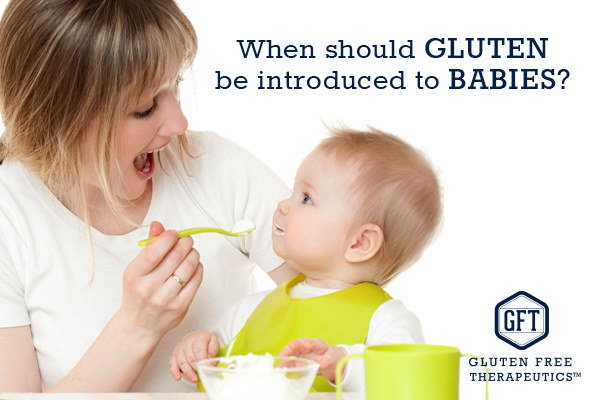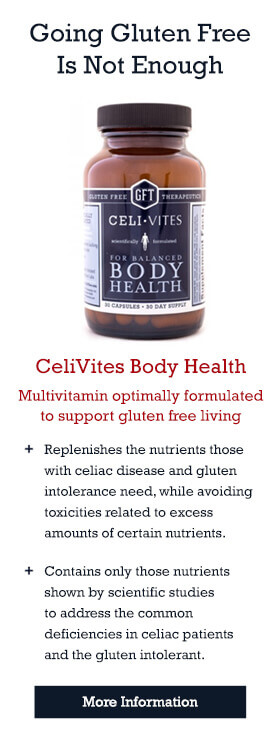
When Should Gluten Be Introduced to Babies?
By Alex Reis, GFT science writer
The Answer: Researchers still don’t know!
Our immune system is fantastic. Not only keeps invading germs under control, but it also “teaches” our body how to tolerate food antigens, including gluten. From the moment of birth, this interaction with the environment shapes how a baby’s immune system reacts to different stimuli. As such, early experiences – including the mother’s and the baby’s diet during breastfeeding and weaning – are likely to have a strong impact in the chances of susceptible individuals developing celiac disease.
Interestingly, for many years researchers have been discussing whether the age at which gluten is introduced to at-risk babies is one of those factors or not.
Maybe it is…
It seems intuitive to expect that early introduction of gluten to babies with an increased risk of celiac disease is associated with a higher possibility of developing this condition. Indeed, several studies over the years have characterised this risk, with results showing children exposed to gluten before 3 months of age can be up to five times more likely to develop celiac disease than those with gluten introduced after they get a little older.
What is somewhat unexpected is that the same studies also spotted an upper age limit, after which the risk of developing celiac disease starts to increase again. Early results showed that if children were not exposed to gluten until after they’re 7 months old, they had a two-fold increased risk compared to those that started receiving gluten before.
This window of opportunity between 4 and 6 months gives the idea of a critical period in which the infant’s immune system is more willing to learn to “tolerate” the presence of food antigens, such as gluten. It is interesting to note that currently the World Health Organisation recommends exclusive breastfeeding until 6 months of age. If this potential adverse effect of delayed introduction of solids proves to be right, it may lead to changes in future guidelines for those at risk of developing celiac disease.
… but maybe it isn’t!
However, more recent research seems to suggest the best period to introduce gluten is not so restricted after all. In fact, in these studies, no differences in terms of risk of developing celiac disease could be attributed to the age at which infants started eating foods containing gluten.
Curiously, when comparing different countries with markedly different approaches in terms of when to introduce gluten and diet at weaning – United States, Finland, Sweden, Geermany – the time when gluten was first introduced was not considered a risk factor for the development of celiac disease.
World-wide recommendations
Despite these less than water-tight results, the advice in most countries around the world is still to take advantage of the window identified earlier and introduce gluten between 4 and 6 months. Ideally, this should be done in small doses when the infant is still breastfeeding, and not receiving formula or bovine milk products. For example, this is the advice given in Europe by the European Society for Paediatric Gastroenterology, Hepatology and Nutrition (ESPGHAN) and in the US, by the American Academy of Pediatrics (AAP).
What other factors may be involved?
Nevertheless, these contradictory results forced researchers to dig a little deeper and find what else may be affecting the infants’ immune system and how it reacts to a first dose of gluten. It turns out the risk of developing celiac disease cannot be assessed by looking at a single factor, but it’s in fact a complex interplay of different elements, including how much gluten is consumed at the time of weaning, whether the baby is being breastfed when gluten is introduced and if so, for how long breastfeeding continues afterwards.
During the “Swedish Epidemic” for example, characterised by an higher than expected rate of patients suffering from celiac disease, the type of flour commonly used in that country had a much higher gluten content than in neighbouring countries. The same applies to different areas in India, where high rates of celiac disease correlate to the level of gluten in the babies’ diet.
In addition, breastfeeding also plays a role in determining how babies react to the introduction of gluten. On one hand, this practice seems beneficial at the time when gluten is first introduced, but if maintained for a long period afterwards, some studies suggest the risk of developing celiac disease increases. This curious “Jekyll and Hyde” scenario is still a conundrum that needs further research to be solved.
This original article is made possible by Gluten Free Therapeutics. Our mission is to educate, inform, and provide the most effective nutritional products possible to allow those with celiac disease and serious gluten intolerances to heal their bodies. CeliVites complete line of superior gluten free supplements includes multivitamin/multimineral supplements, iron supplements, and calcium supplements for people living with celiac disease. All CeliVites products are designed to help you heal, restore and rebuild your body, because going gluten free isn’t enough!
REFERENCES
- Agostoni C, Decsi T, Fewtrell M, Goulet O, Kolacek S, Koletzko B, Michaelsen KF, Moreno L,Puntis J, Rigo J, Shamir R, Szajewska H, Turck D, Van Goudoever J. Complementary feeding: a commentary by the ESPGHAN Committee on Nutrition. J Pediatr Gastroenterol Nutr 2008; 46:99–110.
- Aronsson C, Lee H, Liu E, Uusitalo U, Hummel S, Yang J, Hummel M, Rewers M, She J, Simell O, Toppari J, Ziegler A, Krischer J, Virtanen S, Norris J, Agardh D. Age at Gluten Introduction and Risk of Celiac Disease. Pediatrics 2015, 135(2):239-245
- Guandalini S. The influence of gluten: weaning recommendations for healthy children and children at risk for celiac disease. Nestle Nutr Workshop Ser Pediatr Program. 2007;60:139-51; discussion 151-5.
- Ivarsson A, Myléus A, Norström F, van der Pals M, Rosén A, Högberg L, Danielsson L, Halvarsson B, Hammarroth S, Hernell O, Karlsson E, Stenhammar L, Webb C, Sandström O and Carlsson A. Prevalence of Childhood Celiac Disease and Changes in Infant Feeding. Pediatrics 2013, 131(3): e687 -e694
- Lionetti E, Castellaneta S, Francavilla R, Pulvirenti A, Tonutti E, Amarri S, BarbatoM, Barbera C, Barera G, Bellantoni A, Castellano E, Guariso G, Limongelli MG, Pellegrino S, Polloni C, Ughi C, Zuin G, Fasano A and Catassi C. Introduction of Gluten, HLA Status, and the Risk of Celiac Disease in ChildrenN Engl J Med 2014; 371:1295-1303
- Norris JM, Barriga K, Hoffenberg EJ, et al. Risk of celiac disease autoimmunity and timing of gluten introduction in the diet of infants at increased risk of disease. JAMA 2005; 293:2343–51.
- Johnston M, Landers S, Noble L, Szucs K, Viehmann L. Breastfeeding and the use of human milk. Pediatrics 2012; 129:e827–41.
- Shamir R. Can Feeding Practices during Infancy Change the Risk for Celiac Disease? IMAJ 2012, 14:50-52
- Størdal K, White R and Eggesbø M. Early Feeding and Risk of Celiac Disease in a Prospective Birth Cohort. Pediatrics 2013;132:e1202–e1209
- Szajewska H, Chmielewska A, Pieścik-Lech M, Ivarsson A, Kolacek S, Koletzko S, Mearin ML, Shamir R, Auricchio R, Troncone R; PREVENTCD Study Group. Systematic review: early infant feeding and the prevention of coeliac disease. Aliment Pharmacol Ther. 2012 36(7):607-18.
- Vriezinga S, Auricchio R, Bravi E, Castillejo G, Chmielewska A, EscobarP, Kolaček S, Koletzko S, Korponay-Szabo I, Mummert E, Polanco I, Putter H, Ribes-Koninckx C, Shamir R, Szajewska H, Werkstetter K, Greco L, Gyimesi J, Hartman C, Esch C, Hopman E, Ivarsson A, Koltai T, Koning F, Martinez-Ojinaga E, Marvelde C, Pavic A, Romanos J, Stoopman E, Villanacci V, Wijmenga C, Troncone R and Mearin L. Randomized Feeding Intervention in Infants at High Risk for Celiac Disease. N Engl J Med 2014; 371:1304-1315
Comments ()
















Wheat products sold in the U.S. are contaminated with ROUNDUP or other brands glyphosates. Wheat is not a GMO crop but ROUNDUP is used on it anyways to make it cheaper to harvest and dry. So the gluten in the wheat is already poisonous then it gets a double whammy from the glyphosate herbicide. Why don’t we ban ROUNDUP from being used on wheat? I would suggest to any mother of a newborn to not feed their babies anything that contains wheat!
Read this Book… it Explains it out.
https://www.facebook.com/OfficialWheatBelly?fref=photo